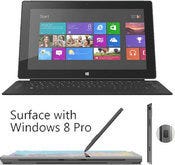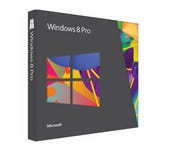Windows 8: Microsoft's Progress DebatedWindows 8: Microsoft's Progress Debated
Windows 8 is one of those good news-bad news Microsoft products. For every sign of success, unanswered questions or signs of flagging momentum appear.


Microsoft Surface Pro: Is It Right For You?
Microsoft Surface Pro: Is It Right For You?(click image for larger view and for slideshow)
If you just read the headlines, it might seem that Microsoft is on a roll with its new Windows products. In the first half of February, Windows Phone posted a 150% year-over-year improvement in market share, Windows 8 users gained access to 750,000 additional apps and analysts speculated that Microsoft Office might be sitting on billions in untapped revenue.
The news might sound encouraging to Redmond fans and, in some ways, the enthusiasm is warranted. The bigger narrative, though, is how these developments reaffirm the obstacles Microsoft faces in executing its Windows 8 strategy.
To date, this strategy has reaped success and failure in indeterminate measure. Microsoft said the 60 million Windows 8 licenses it shipped by early January compares well to Windows 7's "record-setting" launch, for example, which sounds promising but is obfuscated by the fact Microsoft hasn't distinguished consumer-bought licenses from those sold to OEMs. Whatever the number of new Windows 8 installations actually activated in the wild, it wasn't enough to revitalize the floundering PC industry over the holidays. It also didn't stimulate interest in Windows 8's slimmed-down sibling, Windows RT. And though Surface Pro and other new devices will push Windows 8's market share over time, it's difficult to say how much; recent evidence suggests the OS's momentum has been flagging.
[ What else is Microsoft up to? Read Microsoft's Big Data Strategy: An Insider's View. ]
Windows Phone's 150% uptick in market share continues this streak of mixed signs. The number comes from research firm IDC's Worldwide Quarterly Mobile Phone Tracker, published February 14. The report notes that Windows Phone "made market-beating progress," and other studies have come to similar conclusions. Figures recently released by Ad Duplex suggest Windows Phone 8 use in the U.S. has already surpassed that of its two-year old predecessor, Windows Phone 7, for example. And Research firm Strategy Analytics has stated that Windows Phone surpassed BlackBerry in the U.S. for the first time since 2006.
Progress on the mobile front is important to Redmond because, to an extent, Windows Phone 8's growth encourages Microsoft's larger strategy. Windows 8 isn't just an OS; it's the foundation for an Apple-like ecosystem that spans devices and platforms. To succeed, Microsoft needs to be more than an afterthought on the smartphone scene.
But as noted, Windows Phone 8's success has been marked by qualifications and uncertainty. For one thing, the OS snared less than 3% of the mobile market in Q4. Its growth is still important but it's easier to post massive gains when the baseline is so modest. IDC found that Android and iOS managed to grow by 29.2% and 88%, respectively, despite aggregately accounting for 91.1% of the field. Such strong growth from the market leaders somewhat diminishes Windows Phone 8's accomplishment.
What's more, Redmond's smartphone victories might also be fleeting. As information's Eric Zeman recently noted, new BlackBerry 10 devices could threaten Windows Phone 8's progress. Indeed, Redmond might have made mobile gains partly because BlackBerry, having annoyed its customer base with multiple delays of its new OS, didn't put up much of a fight in 2012.
The possibility that Windows Phone 8's success relies too heavily on Nokia is another potential strike against the platform's prospects, as is a February 6 report from comScore that suggest Windows Phone 8's adoption momentum has begun to wane. The report found that 3.6% of U.S. smartphone subscribers used a Windows mobile OS between July and September 2012 but that only 2.9% remained in this category between September and the end of the year. That this downturn occurred precisely as Windows Phone 8 devices started becoming widely available is not particularly auspicious.
Window 8's infusion of 750,000 apps, meanwhile, comes courtesy of the BlueStacks app player. The catch, though, is these aren't native apps; they're from the Android catalogue. BlueStacks has some momentum with this approach, and some Windows 8 users will appreciate the flexibility/ Still, emulated apps aren't a replacement for natives ones. To many, BlueStacks will unavoidably emphasize the dearth of quality apps in the Windows Store.
It's likely no coincidence that Apple's ads began emphasizing the iPad's extensive app catalogue only a week after the Surface Pro went on sale. Apps are crucial to Windows 8's future because Microsoft needs to cultivate consumer appeal to improve its non-existent presence in the tablet space.

Windows 8: 8 Big Benefits For SMBs
Windows 8: 8 Big Benefits For SMBs(click image for larger view and for slideshow)
To be fair, Microsoft's new platform is making progress. Windows CFO Tami Reller has pointed out, for example, that more than 100 million apps have been downloaded and that more users are visiting the Windows Store. Users are also finding alternatives for some of the top missing apps, like PRadio or Rhapsody in place of Pandora. But developer activity has slowed since the holidays and in December, Google nixed Windows 8 plans altogether, dismissing the OS's user base as too small. The 43,000 apps currently available hardly constitute a flop, but at least one Microsoft exec predicted the store would boast 100,000 apps by now. Neither HP's recent experimentation with Google platforms nor Acer CEO JT Wang's condemning remarks are making it easy for Redmond.
The new Windows ecosystem has underperformed without diminishing its potential, in other words -- and that's where Microsoft Office comes in. Morgan Stanley analyst Adam Holt reportedly estimated in a research note that Redmond could generate an additional $2.5 billion by releasing Office for iOS and Android. IDC analyst Bob O'Donnell similarly said in January that such a move would allow Microsoft to "print money."
[ Are you asking the right questions? Read Microsoft Surface Pro: 7 Questions To Ask. ]
Industry-watchers had expected Microsoft to release iOS and Android-friendly versions in November. Redmond CEO Steve Ballmer has declined to discuss the matter, except to suggest that Microsoft thinks its current lineup is sufficient.
Though negotiations with Apple might be delaying new Office options, IDC analyst O'Donnell suggested another why Microsoft is keeping the product line close to the vest: iOS and Android versions would effectively kill Windows RT. Indeed, a pre-installed, if limited, version of Office is one of the key characteristics separating Surface RT from other tablets. What's more, a multi-platform mobile Office would make millions of iPads and Android tablets that much more equipped for enterprise tasks, meaning that whatever revenue Microsoft gains would have to be weighed against hits to Windows 8's growth prospects.
What to do with Office, then, will be part of Microsoft's shifting strategy as it adjusts to Windows 8's hit-and-miss first quarter. Ongoing Windows Blue rumors, which were fueled most recently by a job posting discovered over the weekend, foreshadow some of the possible changes. Blue is expected to transition Redmond's OS updates to an annual model reminiscent of what Apple uses for OS X. It's also expected to further unite the Windows 8 ecosystem, and to form the basis for future app development across all platforms. It remains to be seen, though, if customer-oriented changes -- such as UI tweaks -- are in the cards.
For the present, Microsoft seems content to let devices catalyze Windows 8's momentum. Surface Pro's dual personality as both a laptop and tablet might allow it break through, and if Redmond's new tablet doesn't soar, buyers will have more options once Intel's new Core processers start shipping. Whatever the case, Microsoft and Windows 8, still lacks an unqualified win, and the longer it takes for one to emerge, the more questions lingering questions will eat at the platform's accomplishments.
About the Author
You May Also Like






